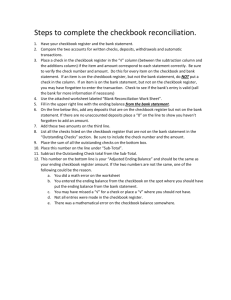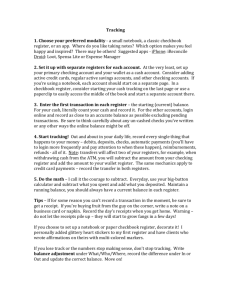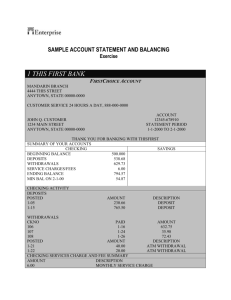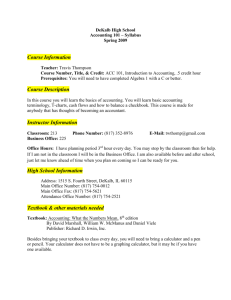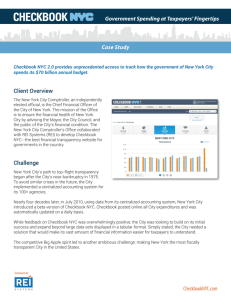Health Club Tips: Choosing, Joining a Gym for 2012 Doesn't Have to
advertisement
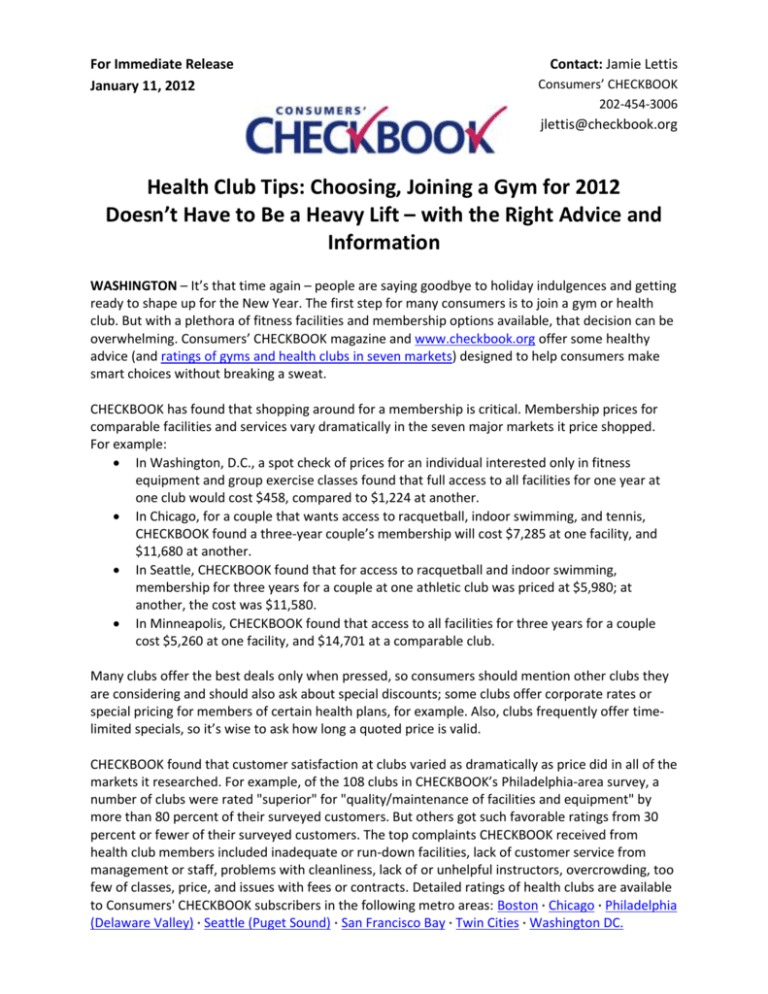
For Immediate Release January 11, 2012 Contact: Jamie Lettis Consumers’ CHECKBOOK 202-454-3006 jlettis@checkbook.org Health Club Tips: Choosing, Joining a Gym for 2012 Doesn’t Have to Be a Heavy Lift – with the Right Advice and Information WASHINGTON – It’s that time again – people are saying goodbye to holiday indulgences and getting ready to shape up for the New Year. The first step for many consumers is to join a gym or health club. But with a plethora of fitness facilities and membership options available, that decision can be overwhelming. Consumers’ CHECKBOOK magazine and www.checkbook.org offer some healthy advice (and ratings of gyms and health clubs in seven markets) designed to help consumers make smart choices without breaking a sweat. CHECKBOOK has found that shopping around for a membership is critical. Membership prices for comparable facilities and services vary dramatically in the seven major markets it price shopped. For example: In Washington, D.C., a spot check of prices for an individual interested only in fitness equipment and group exercise classes found that full access to all facilities for one year at one club would cost $458, compared to $1,224 at another. In Chicago, for a couple that wants access to racquetball, indoor swimming, and tennis, CHECKBOOK found a three-year couple’s membership will cost $7,285 at one facility, and $11,680 at another. In Seattle, CHECKBOOK found that for access to racquetball and indoor swimming, membership for three years for a couple at one athletic club was priced at $5,980; at another, the cost was $11,580. In Minneapolis, CHECKBOOK found that access to all facilities for three years for a couple cost $5,260 at one facility, and $14,701 at a comparable club. Many clubs offer the best deals only when pressed, so consumers should mention other clubs they are considering and should also ask about special discounts; some clubs offer corporate rates or special pricing for members of certain health plans, for example. Also, clubs frequently offer timelimited specials, so it’s wise to ask how long a quoted price is valid. CHECKBOOK found that customer satisfaction at clubs varied as dramatically as price did in all of the markets it researched. For example, of the 108 clubs in CHECKBOOK’s Philadelphia-area survey, a number of clubs were rated "superior" for "quality/maintenance of facilities and equipment" by more than 80 percent of their surveyed customers. But others got such favorable ratings from 30 percent or fewer of their surveyed customers. The top complaints CHECKBOOK received from health club members included inadequate or run-down facilities, lack of customer service from management or staff, problems with cleanliness, lack of or unhelpful instructors, overcrowding, too few of classes, price, and issues with fees or contracts. Detailed ratings of health clubs are available to Consumers' CHECKBOOK subscribers in the following metro areas: Boston · Chicago · Philadelphia (Delaware Valley) · Seattle (Puget Sound) · San Francisco Bay · Twin Cities · Washington DC. CHECKBOOK recommends consumers do the following when shopping for a health club: Consider alternatives. A local government recreation center might fit the bill, and is likely to be a lot cheaper. Cheaper still, of course, and maybe more fun, is taking a run or walk regularly or playing pickup ball at a nearby playground. Before shopping or joining, consumers should think realistically about the kind of workouts they’re likely to stay with consistently. Identify clubs that are close to work or home and check the hours that they are open. Visit clubs during the hours they’re most likely to use them to check how crowded facilities and classes are. Ask members about crowding issues, and about their general satisfaction with their club. Find out how often classes and facilities that interest them are available. If there are sign-up sheets for classes and facilities they might use, look at these sheets to see how easy it will be to get access. Ask questions of instructors, visit classes, and listen to instruction given to other members. Check whether showers are clean, equipment is clean and in good working order, and, when applicable, the pool is clean. Ask about any initiation fees – most clubs charge them – and whether prices quoted are based on a year's commitment. If the club offers month-to-month pricing, consumers should consider choosing that option for a trial period. Carefully read a contract before signing it. Find out about the club’s refund polices for people who wish to cancel or are moving away. See if the club allows members to sell their memberships or freeze monthly payments if they won’t be using the club for an extended time. CHECKBOOK’s editors are available for interviews. To make arrangements, call Jamie Lettis at 202-454-3006. For more information about Consumers’ CHECKBOOK, please visit www.checkbook.org. About Consumers’ CHECKBOOK Consumers’ CHECKBOOK magazine and www.checkbook.org have extensive advice to help consumers get high-quality services at the best possible prices, and have ratings of local auto repair shops, plumbers, doctors, and dozens of other services in seven major metropolitan areas: Washington, D.C., San Francisco Bay, Puget Sound , Chicago, Twin Cities, Boston, and the Delaware Valley. Consumers’ CHECKBOOK is nonprofit and carries no advertising, enabling it to provide ratings of local businesses without any question of bias. CHECKBOOK’s ratings and reports are based on much larger numbers of ratings by consumers than can be found anywhere else, on extensive undercover price checks on each business, and on many other measures of quality and price. Subscriptions to Consumers’ CHECKBOOK include printed magazines and newsletters and also access to extensive ratings and reports, regularly updated online. Subscriptions can be ordered online or by calling 1-800-347-7283. ###

